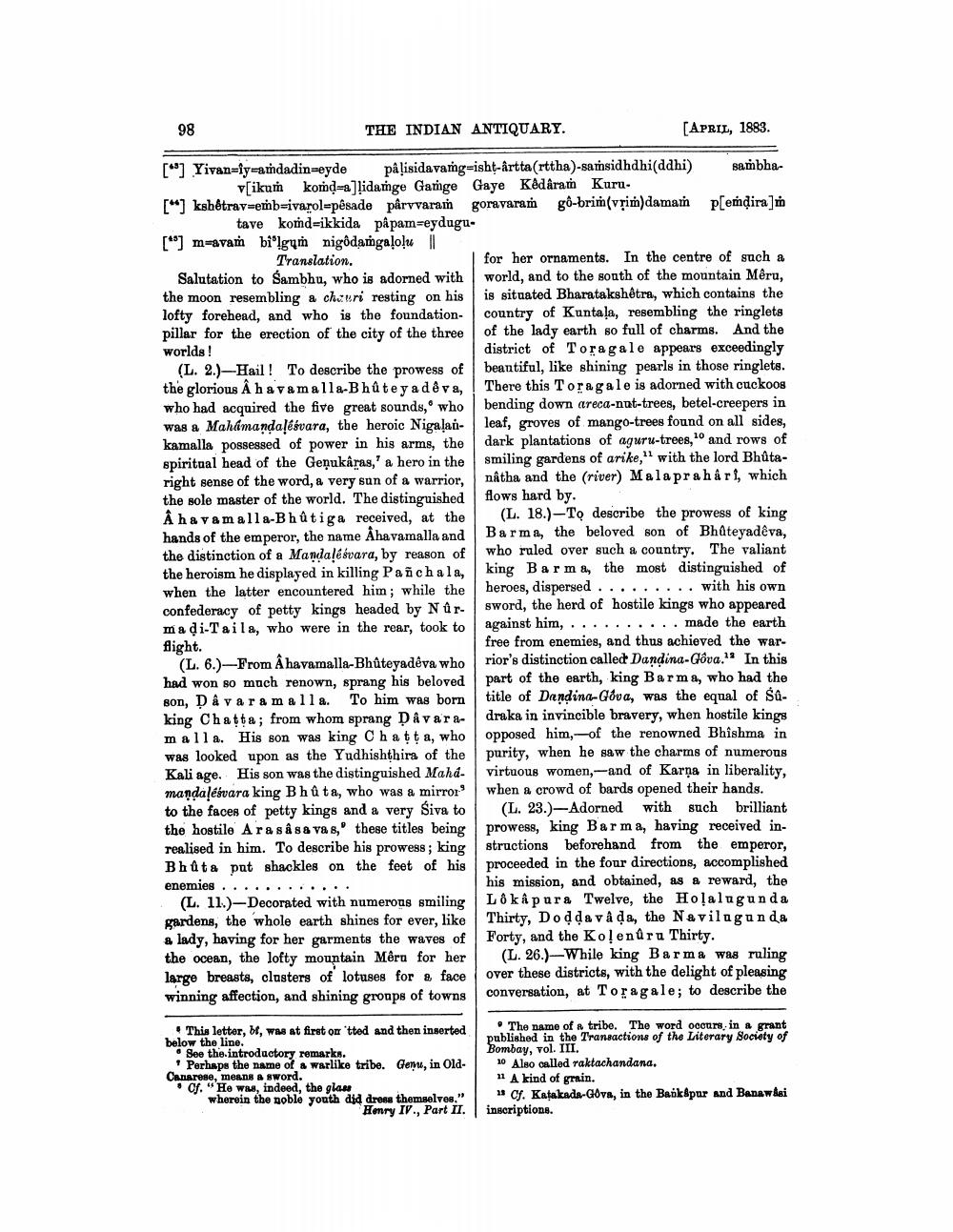________________
98
THE INDIAN ANTIQUARY.
sambha
[] Yivan-iy-amdadin-eyde palisidavashg-ish-Artta(rttha) sachsidhdhi(ddhi) v[ikum komd=a]lidamge Gamge Gaye Kêdâram Kurukshetrav=emb=ivarol-pêsade pârvvaram goravaram go-brim(vrim)damam p[emḍira]m tave komd=ikkida pâpam-eydugu[*] m=avam bilgum nigôdamgalolu || Translation.
[]
Salutation to Sambhu, who is adorned with the moon resembling a cheuri resting on his lofty forehead, and who is the foundationpillar for the erection of the city of the three worlds!
(L. 2.)-Hail! To describe the prowess of the glorious & havamalla-Bhateyadeva, who had acquired the five great sounds, who was a Mahamandalésvara, the heroic Nigalankamalla possessed of power in his arms, the spiritual head of the Geņukâras,' a hero in the right sense of the word, a very sun of a warrior, the sole master of the world. The distinguished Ahavamalla-Bhûtiga received, at the hands of the emperor, the name Ahavamalla and the distinction of a Mandaléévara, by reason of the heroism he displayed in killing Pañchala, when the latter encountered him; while the confederacy of petty kings headed by Nûrmadi-Taila, who were in the rear, took to flight.
(L. 6.)-From Ahavamalla-Bhûteyadeva who had won so much renown, sprang his beloved son, Då vara malla. To him was born king Chatta; from whom sprang Dâvaramalla. His son was king Chatta, who was looked upon as the Yudhishthira of the Kali age. His son was the distinguished Mahdmandalésvara king Bhûta, who was a mirror to the faces of petty kings and a very Śiva to the hostile Ara sâsavas, these titles being realised in him. To describe his prowess; king Bhuta put shackles on the feet of his enemies..
(L. 11.)-Decorated with numerous smiling gardens, the whole earth shines for ever, like a lady, having for her garments the waves of the ocean, the lofty mountain Mêru for her large breasts, clusters of lotuses for a face winning affection, and shining groups of towns
[APRIL, 1883.
This letter, bf, was at first on 'tted and then inserted, below the line.
See the introductory remarks.
Perhaps the name of a warlike tribe. Genu, in OldCanarese, means a sword.
Cf. "He was, indeed, the glass
wherein the noble youth did dress themselves." Henry IV., Part II.
for her ornaments. In the centre of such a world, and to the south of the mountain Mêru, is situated Bharatakshêtra, which contains the country of Kuntala, resembling the ringlets of the lady earth so full of charms. And the district of Tora gale appears exceedingly beautiful, like shining pearls in those ringlets. There this Tora gale is adorned with cuckoos bending down areca-nut-trees, betel-creepers in leaf, groves of mango-trees found on all sides, dark plantations of aguru-trees, 10 and rows of smiling gardens of arike," with the lord Bhûtanatha and the (river) Malapra hâri, which flows hard by.
(L. 18.)-To describe the prowess of king Barma, the beloved son of Bhûteyadêva, who ruled over such a country. The valiant king Barma, the most distinguished of heroes, dispersed. . . . .... with his own sword, the herd of hostile kings who appeared against him,.... .... made the earth free from enemies, and thus achieved the warrior's distinction called Dandina-Gova.1 In this part of the earth, king Barma, who had the title of Dandina-Gova, was the equal of Sudraka in invincible bravery, when hostile kings opposed him,-of the renowned Bhishma in purity, when he saw the charms of numerous virtuous women,-and of Karna in liberality, when a crowd of bards opened their hands.
(L. 23.)-Adorned with such brilliant prowess, king Barma, having received instructions beforehand from the emperor, proceeded in the four directions, accomplished. his mission, and obtained, as a reward, the Lokapura Twelve, the Holalugunda Thirty, Dodda vâ da, the Navilagunda Forty, and the Kolenûru Thirty.
(L. 26.) While king Barma was ruling over these districts, with the delight of pleasing conversation, at Toragale; to describe the
The name of a tribe. The word occurs in a grant published in the Transactions of the Literary Society of Bombay, vol. III.
10 Also called raktachandana.
11 A kind of grain.
Cf. Katakada-Gova, in the Bankspur and Banawasi inscriptions.




